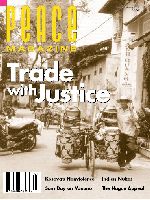
Peace Magazine Jan-Feb 1998, page 29. Some rights reserved.
Search for other articles by Ron Shirtliff here
Douglas Roche, Toronto: Lorimer 1997. 126pp; paper $19.95. ISBN 1-55028-589-0
The title "The Ultimate Evil" is a quotation from the President of the World Court, Mohammed Bedjaoui of Algeria, commenting on the existence of nuclear weapons which, he said, challenges "the very existence of humanitarian law." Douglas Roche, Canada's former Ambassador for Disarmament to the United Nations, takes this as the starting point for his review of the fight to ban nuclear weapons and for his passionate commitment to the success of that project in the not too distant future.
This book is timely, coming as it does after the historic decision of the World Court that "there exists an obligation to pursue in good faith and to bring to a conclusion negotiations leading to nuclear disarmament in all its aspects under strict and effective international control." Further, the dynamics and feelings that the Cold War fostered to make nuclear weapons "acceptable" have lost all credibility. Now there is no argument for mass destruction, and the time is right to renew our attack on the ultimate evil, challenging the nuclear powers, especially the self-appointed world cop, the USA, to face up to the moral depravity of having these weapons.
Roche reviews the rise and proliferation of nuclear weapons, the history of the Non-Proliferation Treaty, the test bans, the Strategic Arms Reduction Treaty, the World Court legal challenge, the proposals for abolition, the counter arguments, and his assessment of the real reasons behind those arguments. Roche is convinced that Canada and similar nations might play a major role in rallying world opinion for abolition, as Canada has done for landmines.
Roche acknowledges that the interests vested in a violent and weapons-filled world are powerful but they are countered by the forces of intellectual honesty; basic human morality, and finally a powerful spiritual hope for a more humanitarian planet.
This book is a good general review of the great moral and physical problem that humanity has faced since Hiroshima. It is clearly written, and despite its size (126 pages) comprehensive, with a good index, useful endnotes, suggestions for further reading, and a new bibliographic aid: a list of selected web sites where a reader might download many of the documents referred to in the text.

Peace Magazine Jan-Feb 1998, page 29. Some rights reserved.
Search for other articles by Ron Shirtliff here